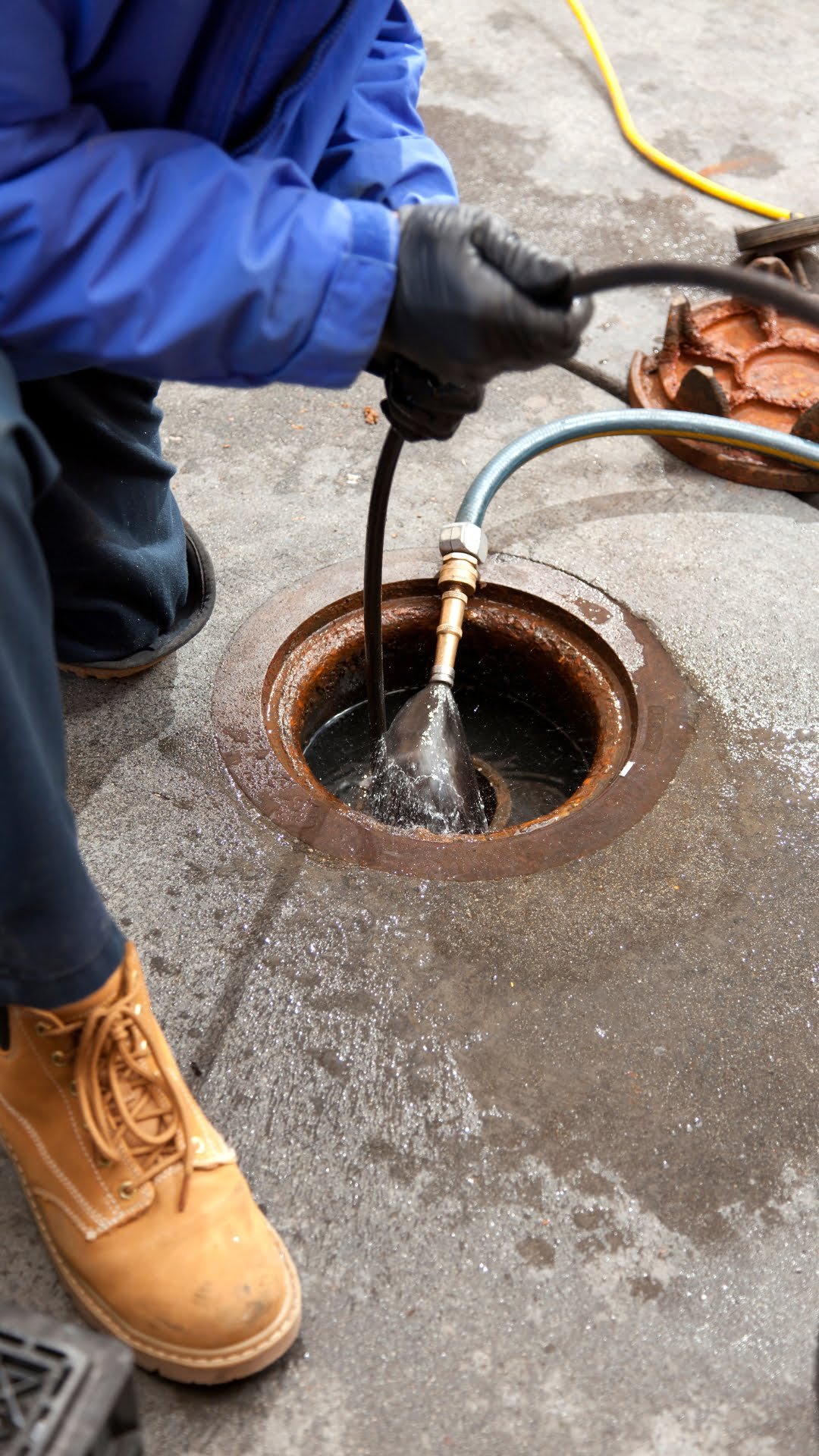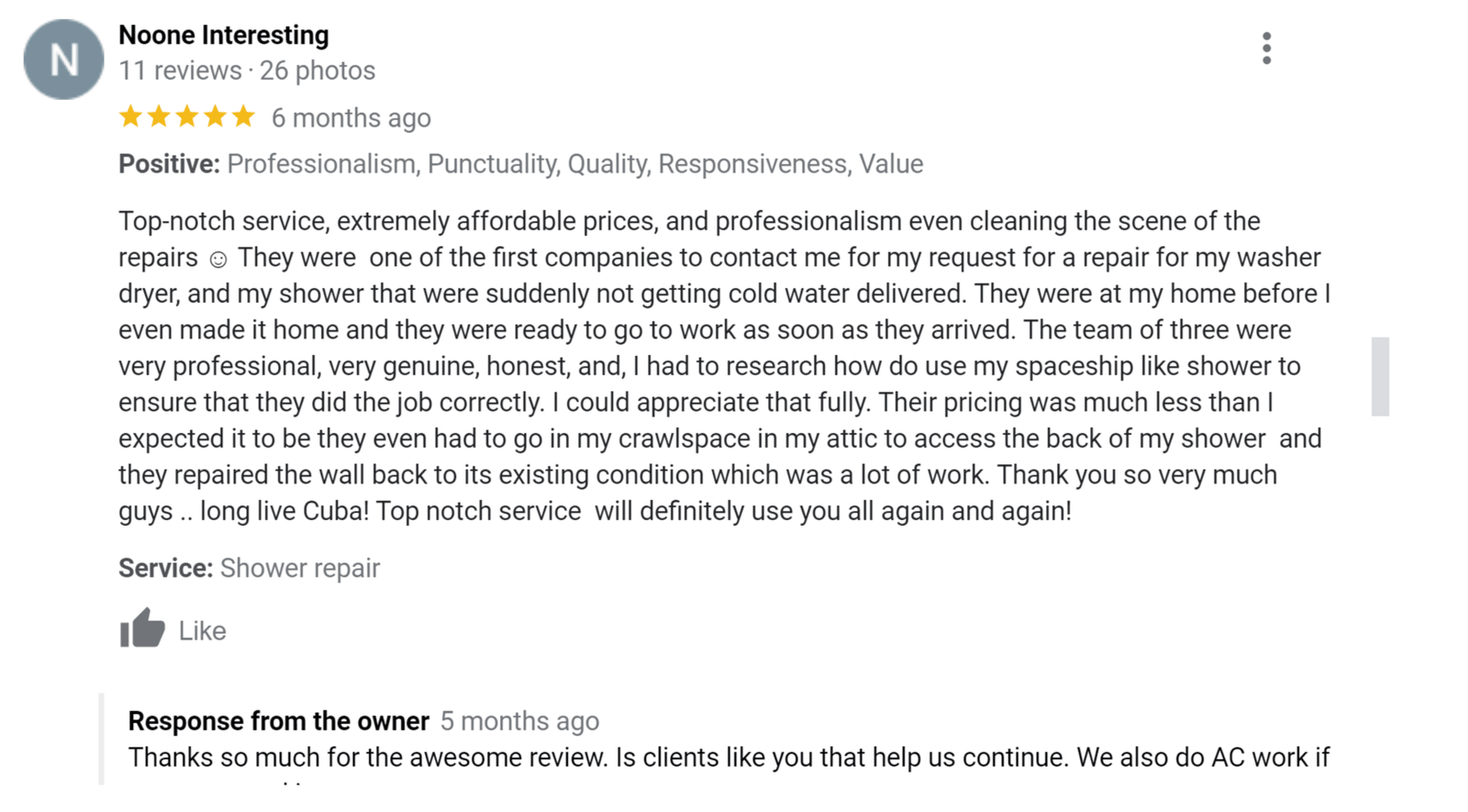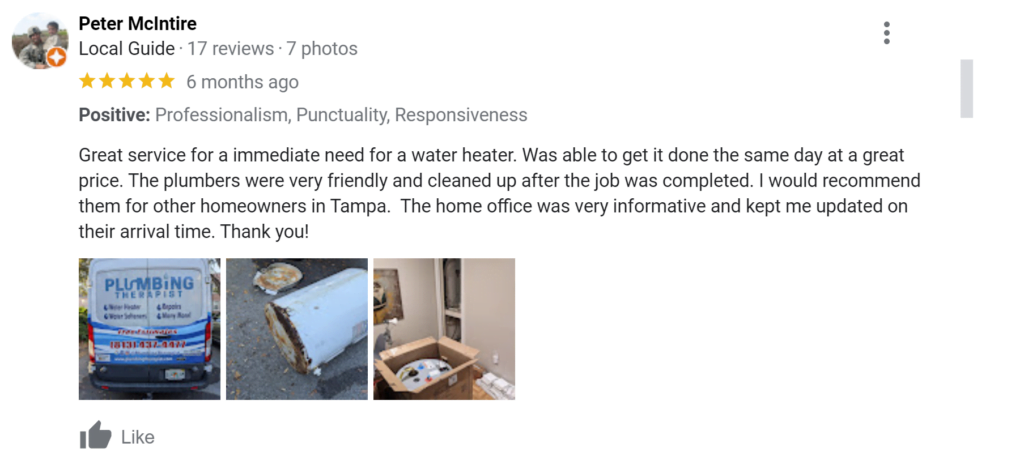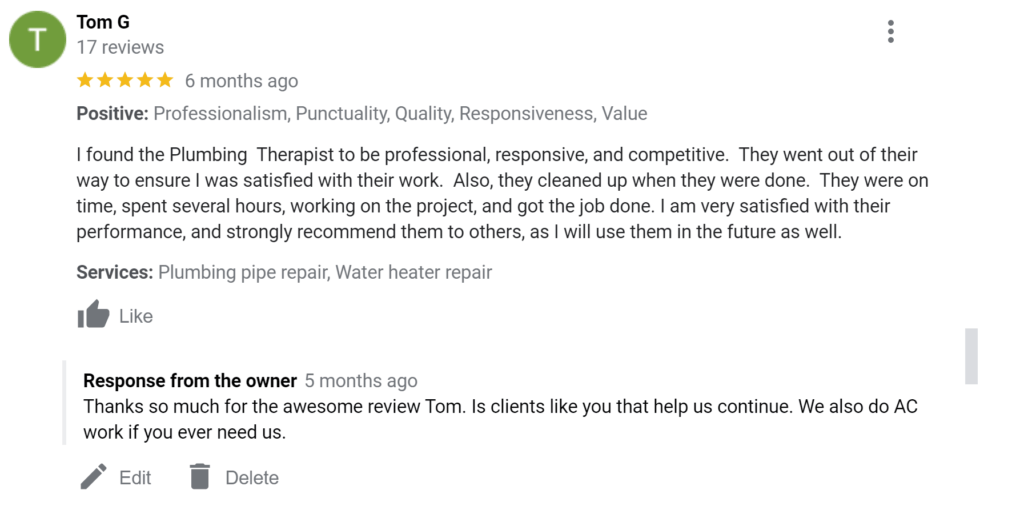Plumbing System Inspection
Plumbing Therapist offers comprehensive plumbing system inspections in Tampa Bay, ensuring your home’s safety and efficiency with expert service.
Do You Need Our Help ?
Feel free to contact us now
$99 Water Heater Flush + Free Plumbing System Inspection
Plumbing System Inspection in Tampa Bay
Expert Plumbing System Inspection Services in Hillsborough County, Pinellas County, and Pasco County
Welcome to Plumbing Therapist, your trusted partner in maintaining a healthy plumbing system in Tampa Bay. Our comprehensive plumbing system inspection services are designed to identify potential issues before they become major problems, ensuring the longevity and efficiency of your plumbing system.
Why Plumbing Inspections are Essential
Plumbing inspections are a critical component of maintaining a healthy, efficient, and safe home or business environment. At Plumbing Therapist, we emphasize the importance of regular inspections for several key reasons:
Preventative Care:
Regular plumbing inspections are vital in preventing plumbing emergencies. These inspections allow our skilled technicians to identify and address minor issues before they escalate into major problems. By conducting routine checks, we can spot early signs of pipe corrosion, leaks, blockages, and wear and tear in your plumbing system. This proactive approach not only ensures the smooth operation of your plumbing but also helps in avoiding unexpected breakdowns and the inconvenience and damage they can cause. Think of these inspections as a regular health check-up for your plumbing system, keeping it in optimal condition and preventing the stress and disruption of emergency repairs.
Cost Savings:
Early detection of plumbing issues is not just about preventing inconvenience; it’s also a matter of significant cost savings. Minor leaks and damages, when left unchecked, can lead to more severe and expensive repairs down the line. For instance, a small leak can escalate into a burst pipe, leading to extensive water damage and the need for costly repairs and replacements. Regular inspections can identify these issues early on, allowing for more affordable and manageable repairs. Additionally, a well-maintained plumbing system operates more efficiently, potentially reducing your water bills and extending the lifespan of your plumbing components, offering long-term financial benefits.
Health and Safety:
The importance of plumbing inspections extends beyond functionality and finances; it’s also a matter of health and safety. A compromised plumbing system can lead to problems like water contamination, mold growth, and poor drainage, all of which pose significant health risks. Regular inspections ensure that your water supply remains clean and safe for use. They also help in maintaining proper sanitary conditions by ensuring that waste is efficiently and safely removed from your property. By preventing leaks and moisture accumulation, we also help in thwarting mold and mildew growth, which are known to cause health issues, especially in individuals with respiratory problems.
At Plumbing Therapist, we believe that regular plumbing inspections are an essential practice for any responsible property owner. They are the key to ensuring the longevity, efficiency, and safety of your plumbing system, ultimately contributing to a healthier, safer living and working environment.

Why partner with Plumbing Therapist?
Quality, Affordability, and Expertise.

No Hidden or Unexpected Charges

Free Estimates & Online Booking Available

Professionally Trained Technicians

Honesty is Guaranteed

Quick Communication & Service Within 24 Hours

400+ 5 Star Reviews

Why do I need a Plumbing System Inspection?
A Plumbing System Inspection is crucial for several reasons, each contributing to the overall well-being and efficiency of your home or business’s plumbing infrastructure:
Early Problem Detection: Regular inspections help in identifying potential issues before they escalate into major problems. This includes detecting leaks, blockages, corrosion, or wear and tear in pipes and fixtures. Catching these issues early can prevent more serious and costly repairs in the future.
Preventing Emergencies: Many plumbing emergencies, like burst pipes or severe blockages, don’t happen overnight. They are often the result of smaller issues that went unnoticed or unaddressed. Regular inspections can spot these issues early, reducing the likelihood of unexpected and inconvenient emergencies.
Cost Savings: Addressing problems early on is generally less expensive than dealing with the aftermath of a major plumbing failure. Regular inspections can save you money in the long run by avoiding extensive damage repairs, water waste, and by ensuring your system is running efficiently.
Maintaining Water Quality: Inspections can reveal issues that may affect the quality of your water, such as pipe corrosion or contamination sources. Ensuring that your plumbing system is in good condition is vital for maintaining a safe and clean water supply.
Enhancing System Longevity: Regular maintenance and inspections can significantly extend the life of your plumbing system. By keeping everything in good working order, you can avoid the premature wear and tear that leads to replacements and overhauls.
Compliance and Safety: For commercial properties, regular plumbing inspections ensure compliance with local health and safety regulations. They also help in maintaining a safe environment for employees and customers.
Peace of Mind: Knowing that your plumbing system has been professionally inspected and is in good condition provides peace of mind. It’s one less thing to worry about in the maintenance of your home or business.
In summary, a Plumbing System Inspection is a proactive measure that helps in maintaining the efficiency, safety, and reliability of your plumbing system, while also offering financial and practical benefits in the long term.
If you would like more information, feel free to give them a call at (813)-437-4477 or you can book online and get their latest discount!
Customer Testimonials: Real Experiences with Plumbing Therapist
We proudly share the experiences and stories of our valued clients. Their feedback provides a glimpse into the quality of service and commitment to excellence we uphold at Plumbing Therapist. You'll read firsthand how our plumbing solutions have improved comfort and efficiency in homes across Tampa Bay. These testimonials illustrate our dedication to customer satisfaction and the difference our expert services can make.




Your questions answered
Common Plumbing System Inspection Questions:
What does a plumbing inspection include?
A plumbing inspection typically includes a comprehensive check of various components of your home’s plumbing system. The goal is to identify any current or potential issues that could lead to future problems or inefficiencies. Here’s what a standard plumbing inspection generally includes:
Pipes and Drains Inspection:
- Checking for leaks, corrosion, and signs of wear and tear.
- Inspecting the condition of visible pipes, including those under sinks and in basements.
- Assessing drain flow to identify any blockages or slow drainage issues.
Faucet and Fixture Checks:
- Examining faucets, showerheads, and other fixtures for leaks and proper operation.
- Testing water pressure to ensure it is within a normal range.
Toilet Inspection:
- Checking toilets for stability, leaks, and efficient flushing.
- Inspecting the internal mechanisms of the toilet tank.
Water Heater Evaluation:
- Assessing the age and condition of the water heater.
- Checking for signs of corrosion, leaks, or other damage.
- Verifying the temperature setting and safety controls.
Sewer System and Septic Tank:
- If applicable, inspecting the sewer line for blockages or damage.
- For homes with septic tanks, checking the tank and leach field for any issues.
Water Quality Test:
- Testing the water for contaminants or unusual characteristics (in some cases).
Sump Pump and Ejector Pump Check:
- If present, testing the operation of sump pumps and ejector pumps to ensure they are functioning correctly.
Inspection of Ventilation Systems:
- Ensuring that ventilation systems associated with plumbing are clear and functioning.
Checking for Compliance:
- Verifying that the plumbing system complies with local codes and regulations.
Inspection Report:
- Providing a detailed report of findings, including any recommendations for repair or maintenance.
It’s important to note that the scope of a plumbing inspection can vary depending on the service provider, the age and condition of the property, and specific homeowner concerns. Some inspections might include additional services like camera inspections of sewer lines or more detailed water quality testing.
How often should I have my plumbing system inspected?
The frequency of plumbing system inspections can depend on several factors, including the age of your home, the condition of your existing plumbing, and whether you’ve experienced previous plumbing issues. However, as a general guideline:
For Most Homes: It’s recommended to have a plumbing inspection at least once every two years. This regular check-up can help identify potential issues before they become major problems.
Older Homes: If your home is over 50 years old, it’s a good idea to have annual inspections. Older plumbing systems, which might use outdated materials or have experienced years of wear and tear, are more prone to problems.
After Major Incidents: If your home has recently undergone significant plumbing repairs or if you’ve experienced major issues like severe blockages or pipe bursts, it’s wise to schedule follow-up inspections more frequently, at least for a short period.
Before Purchasing a Home: Always have a thorough plumbing inspection before buying a new home, regardless of its age. This can help you avoid any unexpected and potentially costly issues after moving in.
If You Notice Problems: If you start noticing issues like low water pressure, strange noises from pipes, discolored water, or frequent clogs, it’s time to schedule an inspection regardless of your last check-up.
Regular plumbing inspections are a key part of home maintenance. They not only help in preventing emergencies but also ensure the efficiency and longevity of your plumbing system.
What are the signs that I need a plumbing inspection?
Recognizing the signs that you need a plumbing inspection can help you address potential issues before they escalate into major problems. Here are some key indicators that it might be time to schedule a plumbing inspection:
Persistent Clogs or Slow Drains: If you’re frequently dealing with clogs or if your drains are consistently slow, it could indicate deeper issues in your plumbing system that need professional attention.
Unusual Noises in Pipes: Banging, whistling, or gurgling sounds coming from your pipes can be a sign of various issues, such as pipe obstructions, water pressure problems, or air in the pipes.
Low Water Pressure: A sudden or gradual decrease in water pressure could be due to a leak, blockage, or other issues in your plumbing system.
Water Stains or Damage: Unexplained water stains on your walls or ceilings, or visible mold growth, can indicate hidden leaks in your plumbing.
Unpleasant Odors: Persistent sewer-like smells can be a sign of a broken vent or sewer pipe, or other issues that should be inspected immediately.
Discolored Water: If the water from your taps is discolored, especially if it’s brown or yellow, it could indicate rust or decay inside your pipes.
High Water Bills: An unexplained increase in your water bill might be due to a leak or a running toilet, which can often go unnoticed.
Age of Plumbing System: If your home’s plumbing system is old or hasn’t been inspected in several years, it’s a good idea to schedule an inspection to ensure everything is in good working order.
After Severe Weather Events: Following extreme weather conditions like heavy rains or flooding, it’s prudent to have your plumbing system checked for any potential damage.
Before a Major Home Renovation: If you’re planning significant renovations, especially in areas involving plumbing, an inspection beforehand can help you understand the current state of your plumbing system.
If you notice any of these signs, it’s advisable to contact a professional plumber for an inspection. Early detection and repair can save you from more costly and extensive repairs in the future.
What are the risks of not having regular plumbing inspections?
Neglecting regular plumbing inspections can lead to a variety of risks and potential problems for homeowners. Some of the key risks include:
Undetected Leaks: Small leaks can go unnoticed without regular inspections. Over time, these can lead to significant water damage, mold growth, and structural issues, especially if they occur within walls or under floors.
Pipe Corrosion and Damage: Without regular checks, corrosion or damage to pipes can progress to the point where they become severe, leading to leaks, bursts, and costly repairs or replacements.
Increased Water Bills: Minor leaks or running toilets that are not addressed promptly can result in higher water bills due to wasted water.
Sewer Backups: Regular inspections can catch early signs of sewer line issues. Without these checks, you might face severe sewer backups, which are not only costly to repair but also pose health hazards and significant inconvenience.
Reduced Water Quality: Plumbing issues can affect the quality of your water. Corroded pipes, for instance, can lead to contamination and health risks.
Plumbing Emergencies: Many plumbing emergencies, such as burst pipes, are often the result of smaller issues that were left unchecked. Regular inspections can prevent these emergencies.
Shortened Lifespan of Plumbing Components: Regular maintenance, including inspections, can extend the life of your plumbing system. Neglecting this can lead to premature wear and the need for early replacements.
Inefficiencies in Water Heating: Issues with water heaters, such as sediment build-up or malfunctioning components, can go unnoticed, leading to inefficiency and higher energy costs.
Violation of Warranty or Insurance Terms: In some cases, failing to maintain regular plumbing inspections can violate the terms of warranties or home insurance policies, potentially leading to issues if a claim is made.
Decreased Home Value: Ongoing plumbing issues can negatively impact the value of your home, especially if they lead to significant damage or are indicative of poor overall maintenance.
Regular plumbing inspections are a proactive measure to ensure the health and efficiency of your home’s plumbing system, helping to avoid these risks and potential costs.
How long does a plumbing inspection take?
The duration of a plumbing system inspection can vary depending on several factors, including the size and complexity of your home’s plumbing system, the age of the property, and the specific services included in the inspection. However, to give you a general idea:
For a Standard Plumbing System Inspection: In most average-sized homes, a standard plumbing system inspection typically takes between 1 to 2 hours. This type of inspection involves a thorough check of visible pipes, fixtures, faucets, toilets, and the water heater.
In-Depth Plumbing System Inspection: If the plumbing system inspection includes more comprehensive services, such as camera inspections of sewer lines or detailed testing of water quality, it might take longer, possibly up to 3 to 4 hours. This is especially true for larger homes or older properties where the plumbing system might be more complex or require more careful examination.
Plumbing System Inspection for Large Properties: For commercial properties or very large residential properties, the plumbing system inspection can take a full day or even longer. This is due to the larger size of the plumbing system, which requires more time to thoroughly inspect each component.
Follow-Up Inspections: If a preliminary plumbing system inspection reveals issues that require a more detailed examination, a follow-up visit may be scheduled. The duration of this follow-up will depend on the nature of the problems identified.
It’s important to note that while a plumbing system inspection might take a few hours, it’s a crucial investment in maintaining the health and efficiency of your home’s plumbing system. Regular inspections can help identify potential issues early, saving time and money in the long run by preventing major plumbing emergencies.
What should I do to prepare for a plumbing inspection?
Preparing for a plumbing system inspection is an important step to ensure that the process is smooth and efficient. Here are some tips on how you can get ready for a plumbing system inspection:
Clear Access Areas: Before the plumbing system inspection, make sure to clear any clutter or obstructions around key areas of your plumbing system. This includes under sinks, around water heaters, and near main water lines. Providing clear access will help the inspector conduct the plumbing system inspection more efficiently.
Check for Visible Issues: Before the plumbing system inspection, it’s a good idea to do a quick check of your own. Look for any visible signs of leaks, corrosion, or damage in your plumbing system. While the plumbing system inspection will be thorough, knowing about any obvious issues beforehand can be helpful.
List Any Concerns: If you have specific concerns or have noticed issues with your plumbing system, list them down to discuss during the plumbing system inspection. This can include things like areas where you’ve noticed leaks, unusual noises, or changes in water pressure.
Ensure Water Heater Accessibility: For a comprehensive plumbing system inspection, access to your water heater is crucial. Make sure the area around it is clear. If you have any settings or pilot lights turned off, ensure they are on for the plumbing system inspection.
Prepare Outdoor Areas: If part of your plumbing system inspection includes outdoor components like sewer lines or outdoor faucets, ensure these areas are accessible. Clear any debris or garden equipment that might obstruct the plumbing system inspection.
Secure Pets: To ensure the safety of both your pets and the plumbing inspector, secure your pets away from the areas where the plumbing system inspection will take place.
Availability for Questions: Be available to answer any questions the inspector might have during the plumbing system inspection. Your insights about the plumbing system’s history and performance can be valuable.
Documentation: If you have any previous reports or documents related to your plumbing system, have them available for the inspector to review during the plumbing system inspection.
Understand the Scope: Before the plumbing system inspection, understand what the inspection will cover. Knowing what to expect can help you prepare better.
Post-Inspection Follow-Up: After the plumbing system inspection, be prepared to discuss any findings or recommendations with the inspector. They may suggest repairs, maintenance, or follow-up inspections for your plumbing system.
By following these steps, you can ensure that your plumbing system inspection goes smoothly and provides the most accurate assessment of your plumbing system’s condition. Remember, a well-prepared plumbing system inspection is key to maintaining the health and efficiency of your home’s plumbing infrastructure.

